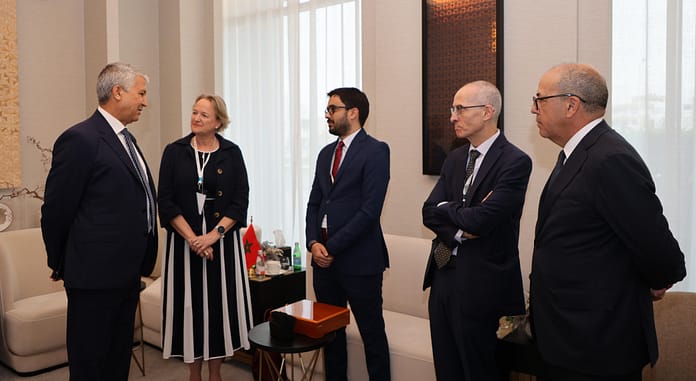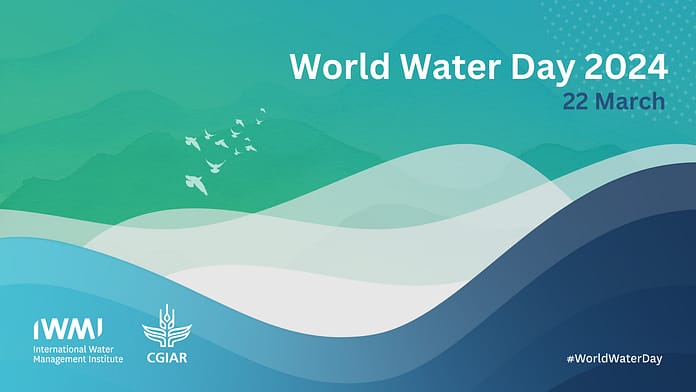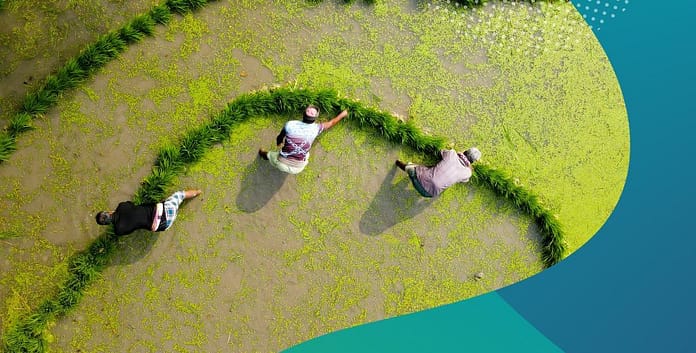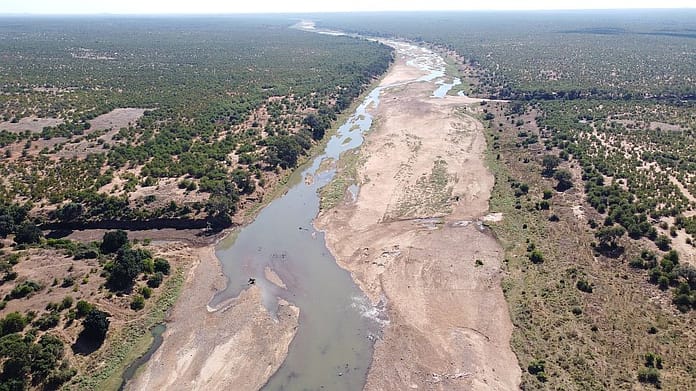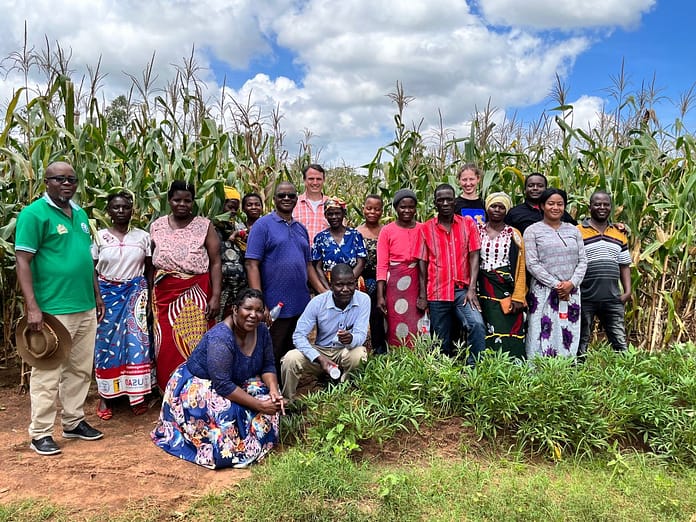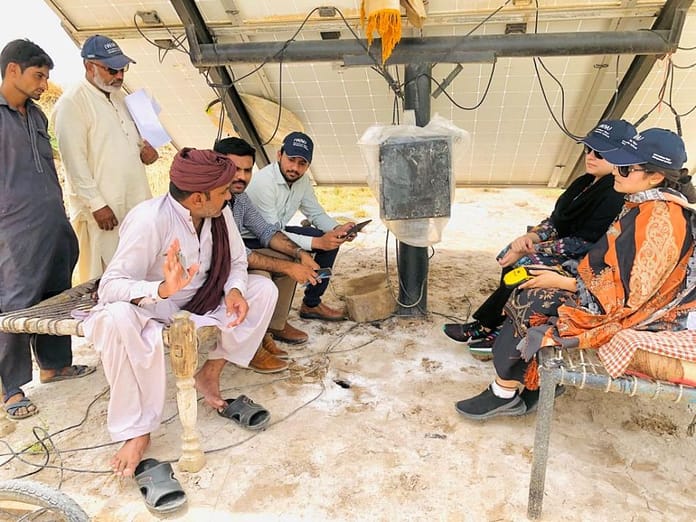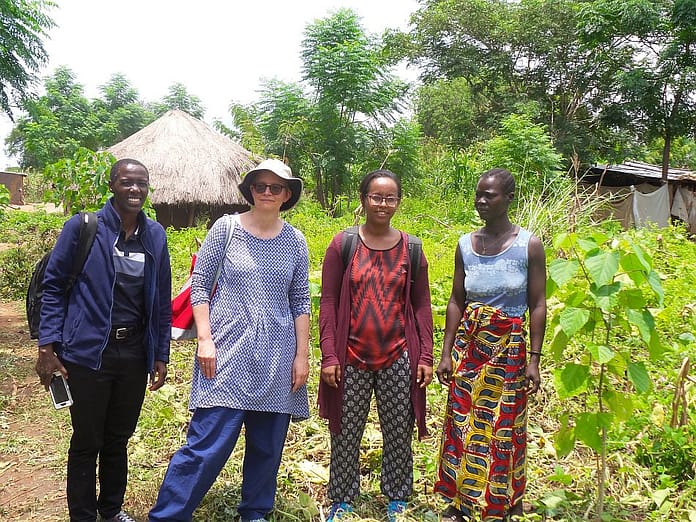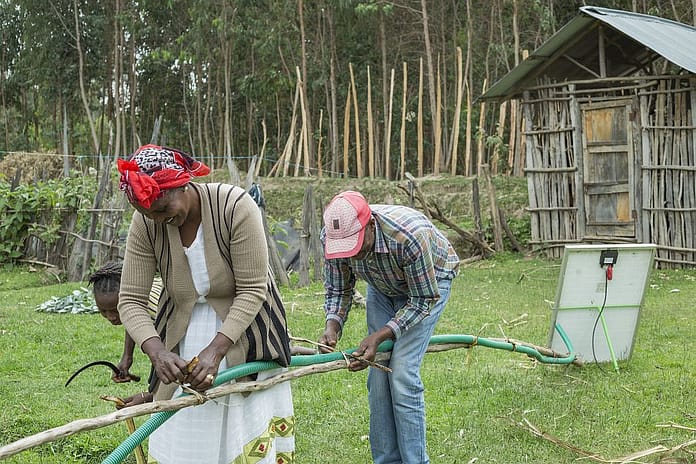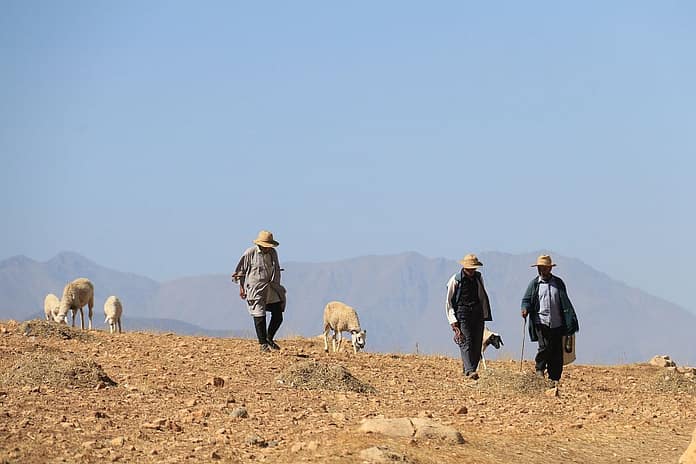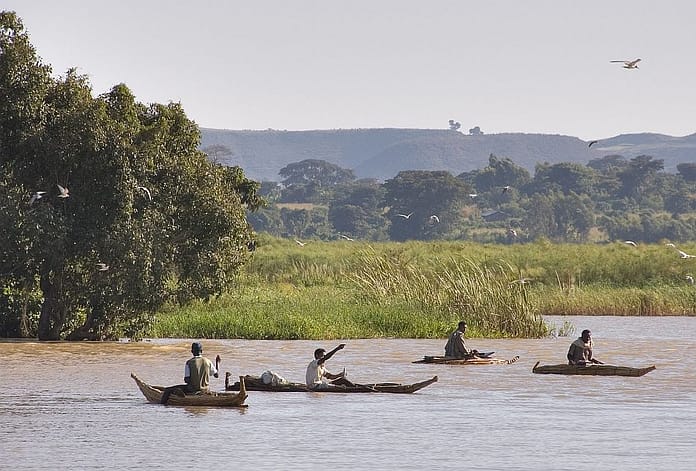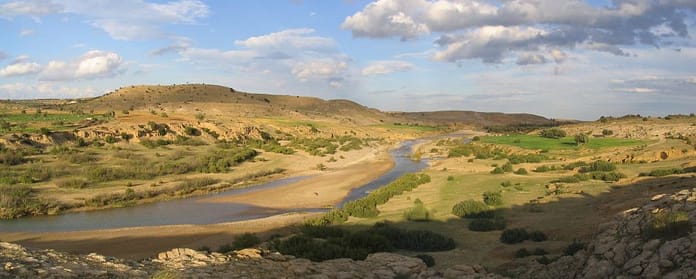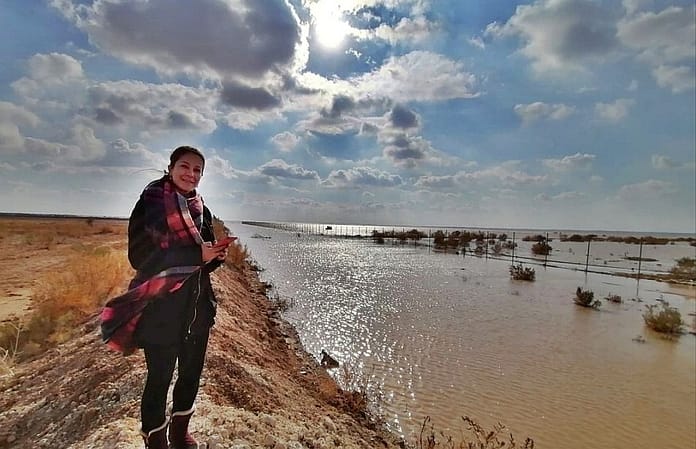By Isis Palay, Consultant
From March 21 to 26, the 9th World Water Forum in Dakar, Senegal — the first such event held in sub-Saharan Africa — brought together more than 5,000 members of the international water community. Throughout a week of rich programming, IWMI engaged with partners, government officials, policymakers, business representatives, journalists, researchers, donors, and a wide range of other water stakeholders as our delegation shared IWMI’s vision for strengthening water security and climate resilience across West Africa and around the world.

IWMI experts participated in 17 events during the World Water Forum, including several sessions hosted at the Nature Hub Pavilion, which IWMI supported as a core partner. Here, alongside 29 partner organizations, IWMI signed the Water and Nature Declaration to foster greater collaboration on finding ecological solutions for pressing water and climate issues. Elsewhere at the World Water Forum, a number of IWMI-affiliated events were also hosted by the African Ministers’ Council on Water (AMCOW) and African Development Bank (AfDB) Pavilion.
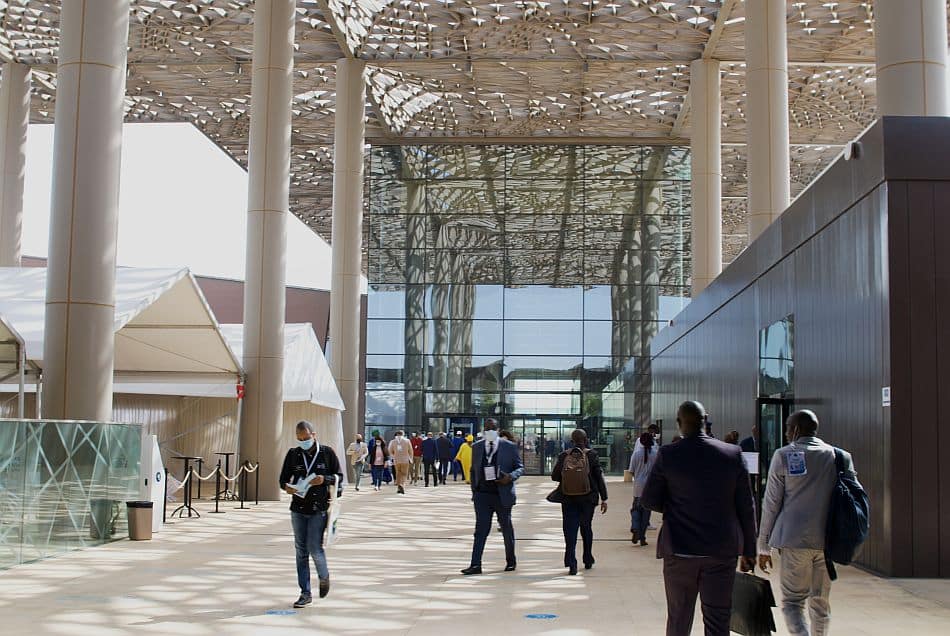
Introducing the Science for a Water-Secure World initiative
One of IWMI’s first sessions at the World Water Forum introduced a new year-long Science for a Water-Secure World (SWSW) initiative, which will build partnerships among the policy, business, development, practitioner, and science communities from the Global South and Global North to focus and strengthen the science base for action on water security. The initiative aims to ensure that political progress towards a more urgent and coherent agenda for water policies, investments, strategies, and accelerated action is better supported by scientific progress.
Led by IWMI Director General Mark Smith and moderated by IWMI West Africa Representative Olufunke Cofie, the panel for IWMI’s March 21 SWSW event included representatives from the global community of young scientists, U.K. Foreign, Commonwealth and Development Office (FCDO), Danone, the Nature Conservancy, the West African Science Service Centre on Climate Change and Adapted Land Use (WASCAL) and the Government of Ghana, who agreed on the pressing need for a water systems science coalition between local communities and the public and private sectors. “The floods and droughts we are seeing around the world are announcing what’s coming,” said Mark Smith, highlighting the need for urgent action. “The alarm bells are ringing.”
Click here to watch a recording of this session at the World Water Forum’s Nature Hub Pavilion.
Click here for more information on the Science for a Water-Secure World initiative.
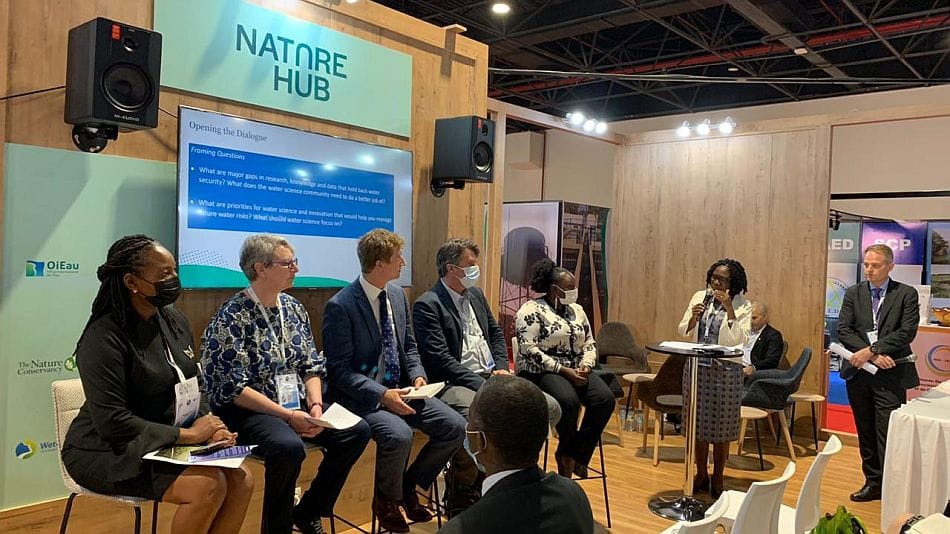
Launching the UN World Water Development Report
Day two of the World Water Forum, March 22 — World Water Day — saw the release of the UN World Water Development Report titled ‘Groundwater — Making the Invisible Visible’. An expert panel was convened to introduce the report and its findings. Alongside AMCOW Executive Secretary Rashid Mbaziira, UNECE Water Convention Secretary Sonja Koeppel, and Advisor to the Chief of Government of Tunisia Akiça Bahri, IWMI Principal Researcher Karen Villholth shared her insights on how to most effectively mitigate future challenges related to the use and management of groundwater.
Offering insightful testimonies, experts from across the African continent called for collaborative interventions and strategies to help protect African transboundary aquifers, which constitute about 20 percent of the world’s groundwater resources. The event also featured an engaging conversation highlighting how investments, innovation, and recruitment of young water professionals are overdue in places where groundwater’s potential for strengthening water security and climate resilience remains relatively untapped.
IWMI also supported AMCOW in the launch of their White Paper on Groundwater for Africa’s Resilience and Socioeconomic Transformation during a session dedicated to the pan-African Groundwater Program. The White Paper calls for careful and evidence-based development of groundwater as core to Africa’s resilience and prosperity.
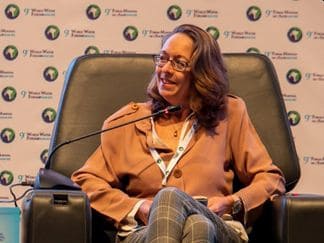
Bridging the gap between science and policy ahead of the UN 2023 Water Conference
In advance of next year’s UN 2023 Water Conference, a panel of experts and representatives from different water stakeholder groups also gathered at the World Water Forum on World Water Day to discuss some of the most pressing issues to be addressed at the conference. During this discussion, IWMI’s Olufunke Cofie said collaborative processes and dialogue must help inform water inventions, and she highlighted the need for a coherent water agenda at the international level.
“As we are confronting new risks, our strategies must change,” she said. “We must mobilize collectively and create a global agenda for water — this is why IWMI is launching its new Science for a Water-Secure World initiative.”

Celebrating AMCOW with a new Memorandum of Understanding
World Water Day also marked AMCOW’s 20th anniversary. IWMI’s delegation joined AMCOW and the World Water Council to celebrate the work of leaders, ministers, and water managers who have been strengthening intra-continental cooperation on sustainable water resources management and water supply improvements.
To mark the occasion, Mark Smith signed a Memorandum of Understanding to formalize IWMI’s partnership with AMCOW, affirming our strong commitment to support the mission of Africa Water Vision 2025 through the work of IWMI’s four African offices. We look forward to continuing to share our expertise on water quality, sustainable groundwater management, digital innovation, and other key water topics to assist AMCOW in strengthening evidence-based policy initiatives to further improve water security and climate resilience across the continent.
[slideshow_deploy id=’47907′]Digital innovations offer new pathways to strengthen water security
On March 23, the third day of the World Water Forum, IWMI returned to the Nature Hub Pavilion, as Research Group Leader Giriraj Amarnath and East Africa Representative Abdulkarim Seid presented the Digital Innovations for a Water-Secure Africa (DIWASA) project, which will support nine Nile Basin countries with the development and implementation of digital innovations.
“We’re developing innovations for three pillar purposes — water accounting, resilience, and storage,” Amarnath explained at the event. “We welcome any innovative group in our efforts to ensure water security and climate resilience in Asia and Africa.”
“Our project aims at building champions in the region,” added Seid, “to make sure they can share knowledge and build capacity to foster change and promote resilience to climate risks.”
Click here to watch a recording of this session at the World Water Forum’s Nature Hub Pavilion.

Deepening the connections between wetlands and water security
IWMI participated in another Nature Hub Pavilion session on March 23 that showcased wetlands’ importance as vital arteries for delivering water security to communities across the Sahel. Highlighting the Blue Lifelines for a Secure Sahel (BLiSS) Initiative, this programming and networking event, staged in partnership with Wetlands International, Care International, and International Alert, drew in participants from across the water community. The session promoted a shared understanding of the need to safeguard wetlands for water security, greater resilience, climate risk reduction, and improved human security, and explored the mechanisms needed to address challenges related to the sustainable use of Sahel wetlands.
Exploring the water-energy-food nexus and smart water management
On the fourth day of the World Water Forum, March 24, IWMI Southern Africa Representative Inga Jacobs-Mata led a Water and Energy for Food dialogue at the AMCOW Pavilion on policy and finance for the water-energy-food nexus. Panelists at this session presented various ways to help farmers produce more food with less water, and showed how scaling innovation can lead to more sustainable and resilient agricultural food value chains. The event also highlighted impactful initiatives dedicated to improving food security and enhancing climate adaptation, including interventions that emphasize inclusive financing and technical assistance for small businesses.
Also on day four, IWMI Senior Researcher Tafadzwanashe Mabhaudhi and Giriraj Amarnath spoke as part of a panel for a ‘Smart Water Management’ session, discussing how technological and social innovation can help strengthen climate security. They highlighted various tools for collecting climate information, improving on-farm water management, and facilitating supplementary irrigation, and talked about how such tools can contribute to efficient and holistic water management strategies.
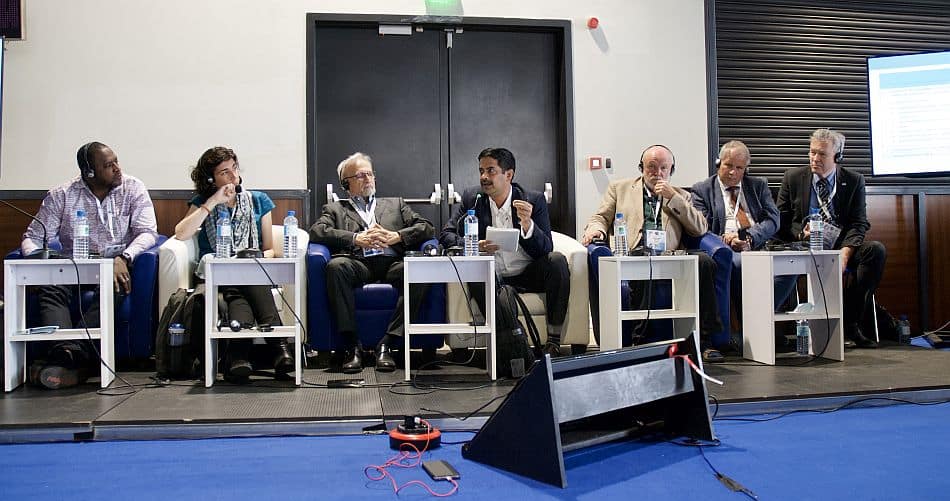
“The climate crisis is a water crisis.”
Another successful IWMI session was titled “Water for Agricultural Climate Resilience.” Led by IWMI’s Olufunke Cofie, this event drew in participants from the World Bank, the African Development Bank Group, the FAO, the AFD, UNOPS, and the Daugherty Water for Food Global Institute. IWMI’s Abdulkarim Seid spoke about market system analysis, economic opportunity for youth and women, and capacity building efforts as the pillars of inclusive business models for smallholder farmers, and discussed some of the ways in which IWMI is further fortifying these pillars.
Meanwhile, Giriraj Amarnath noted the deep connectivity between water and climate. “Close to 80 percent of extreme weather events are water-related,” he said. “The climate crisis is a water crisis. The solutions must be holistic, and take migration, inequalities, and region-specific challenges into account.”
Building climate resilience through bottom-up approaches
Held on the fifth and final day of the World Water Forum, the IWMI-led ClimBeR (Building Systemic Resilience against Climate Variability and Extremes) workshop gathered policy planners, government representatives, and members of the private sector to discuss ways of scaling climate resilience policy and action through multi-scale governance and bottom-up approaches.
“A critical thing to keep in mind is that the success of CGIAR and ClimBeR depends on partnerships, institutions like ours coming together under this broad agenda to make a real difference at the scale that is needed,” said IWMI’s Mark Smith in his opening remarks.
Co-organized by CGIAR and the IPAR (Rural and Agricultural Prospective Initiative), and led by IWMI’s Giriraj Amarnath and Olufunke Cofie, the workshop laid a foundation for the development of a community of ‘champions of change.’
[slideshow_deploy id=’47909′]On the road to Sharm El-Sheikh: Looking ahead to COP27
As the World Water Forum concluded, IWMI Deputy Director General Rachael McDonnell participated in a conversation titled “Beyond COP26, toward COP27.” During this event, she showcased IWMI’s new Al Murunah project, which will promote various measures to improve adaptation to climate extremes across the Middle East and North Africa — coincidentally, the site of the upcoming U.N. COP27 climate summit later this year in Sharm El-Sheikh, Egypt.
The ongoing effort of IWMI and partners to ensure water receives prominent placement on the COP27 agenda built considerable momentum during the World Water Forum. After two years of pandemic-induced uncertainty and separation, March’s gathering of the global water community in Dakar provided us with the opportunity to reenergize and rededicate our urgent efforts to deploy water solutions at scale to strengthen water security and climate resilience for communities that today find themselves on the frontlines of climate change.


